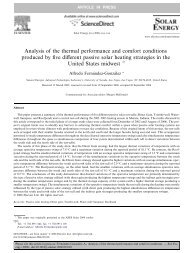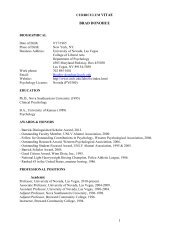activities was not currently required by all instructors; this may have influenced students’perceived usefulness and actual interaction.When teachers and administrators are making decisions regarding the online option for theirstudents, considerations need to be made with respect to synchronous and asynchronousinteractions. This study revealed that the importance <strong>of</strong> a strong interactive mathematicscurriculum is vital for student achievement. Students need the opportunity to not only passivelyread a rich mathematical content, but also be an active participant engaging in simulations thatallows for the transfer <strong>of</strong> mathematical knowledge to mathematical practice and application.This study also revealed that the use <strong>of</strong> threaded discussion boards should be done withcaution. Threaded discussion boards can be a powerful tool if used properly. Teachers andstudents can engage in rich mathematical dialogue within the comforts <strong>of</strong> their own time andlearning environments. Participants can thoroughly research questions and answers beforeengaging and responding, thereby strengthen the mathematical dialogue.Finally this study showed the power <strong>of</strong> synchronous interactions. Online course are <strong>of</strong>tenused to remediate mathematics skills to the most struggling students. Often students are givenaccess to s<strong>of</strong>tware in to supplement the current learning environment. However students,especially low-level students should not be learning online in complete isolation. As seen fromthis study, algebra and pre-algebra benefited from the synchronous interactions. Students wereable to directly ask their questions in real-time, there by fostering deeper relationships with theirteacher.There is limited in research pertaining to online learning, specifically learning mathematics.Future research must focus not only on higher education, but more importantly on the k-12learning population. This study showed the importance <strong>of</strong> interactions in general, but futurestudies are necessarily to find the power <strong>of</strong> such interactions. Future investigations must studyeach interaction, and combination <strong>of</strong>, as they influence not only the perception <strong>of</strong> learningmathematics, but also overall mathematical achievement.ReferencesAnderson, T. (2003). Getting the mix right again: An updated and theoretical rationale forinteraction. International Review <strong>of</strong> Research in Open and Distance Learning, 4(2), 1-14.Anderson, T., & Kuskis, A. (2007). Modes <strong>of</strong> interaction. In M. G. Moore (Ed.), Handbook <strong>of</strong>distance education (2 nd ed.). (pp. 295-310). Mahwah: Lawrence Erlbaum Associates.Collison, G., Elbaum, B., Haavind, S., & Tinker, R. (2000). Facilitating online learning.Madison, Wisconsin: Atwood Publishing.<strong>Proceedings</strong> <strong>of</strong> the 40 th Annual Meeting <strong>of</strong> the Research Council on Mathematics Learning <strong>2013</strong> 169
Cox, G., Carr, T., & Hall, M. (2004). Evaluating the use <strong>of</strong> synchronous communication in thetwo blended courses. Journal <strong>of</strong> Assisted Learning, 20, 183-193.Holden, J. T., & Westfal, P. J. L. (2010). An instructional media selection guide for distancelearning - Implications for blended learning. Retrieved fromhttp://www.usdla.org/assets/pdf_files/AIMSGDL%202nd%20Ed._styled_010311.pdfLou, Y., Bernard, R. M., & Abrami, P. (2006). Media and pedagogy in undergraduate distanceeducation: A theory-based meta-analysis <strong>of</strong> empirical literature. Educational TechnologyResearch and Development, 54(2), 141-176.Moore, M. (1989). Three types <strong>of</strong> interaction. American Journal <strong>of</strong> Distance Education, 3(2), 1-6.Moore, M. (2007). The theory <strong>of</strong> transactional distance. In M. Moore (Ed.), Handbook <strong>of</strong>distance education (2 nd ed.). (pp. 89-108). Mahwah: Lawrence Erlbaum Associates.North American Council for Online Learning (2007). Top ten myths about virtual schools.Retrieved fromhttp://www.inacol.org/research/docs/Ten%20Myths%20About%20Virtual%20Schools.pdfPicciano, A., & Seaman, J. (2009). K-12 online learning: A 2008 follow up <strong>of</strong> the survey <strong>of</strong> U.S.school district administrators. The Sloan Consortium.Project Tomorrow (2010). Learning in the 21st century: 2010 trends update. Retrieved fromhttp://www.tomorrow.org/speakup/learning21Report_2010_Update.htmlSimonsen, L., & Banfield, J. (2006). Fostering mathematical discourse in online asynchronousdiscussions: An analysis <strong>of</strong> instructor interventions. Journal <strong>of</strong> Computers inMathematics and Science Teaching, 25(1), 41-75.Smith, G. G., Ferguson, D., & Caris, M. (2003). The web versus the classroom: Instructorexperiences in discussion-based and mathematics-based disciplines. Journal <strong>of</strong>Educational Computing Research, 29(1), 29-59.Snelson, C. (2002). Online mathematics instruction: An analysis <strong>of</strong> content. Paper presented atthe Northern Rocky Mountain Educational Research Association <strong>Conference</strong>, Estes Park,CO.Suh, J., & Moyer, P. (2007). Developing students' representational fluency using virtual andphysical algebra balances. Journal <strong>of</strong> Computers in Mathematics and Science Teaching,26(2), 155-173.Wahlstrom, C., Williams, B. K., & Shea, P. (2003). The successful distance learning student.Belmont, CA: Wadsworth/Thomson Learning.Warschauer, M. (1997). Computer-mediated collaborative learning: Theory and practice. TheModern Language Journal, 81(4), 470-481.Watson, J. F., & Ryan, J. (2006). Keeping pace with K-12 online learning: A review <strong>of</strong> statelevelpolicy and practice. Retrieved fromhttp://www.learningpt.org/pdfs/tech/Keeping_Pace2.pdfWatson, J. F. (2007). A national primer on K-12 online learning. Retrieved fromhttp://www.inacol.org/research/docs/national_report.pdf<strong>Proceedings</strong> <strong>of</strong> the 40 th Annual Meeting <strong>of</strong> the Research Council on Mathematics Learning <strong>2013</strong> 170
- Page 1 and 2:
….where the Mathematicscomes swee
- Page 3 and 4:
THANK YOU TO OUR REVIEWERSKeith Ado
- Page 5 and 6:
Table of ContentsPreservice Teacher
- Page 7 and 8:
Support for Students Learning Mathe
- Page 9 and 10:
own problem solving, which is criti
- Page 11 and 12:
to get started and persistence. Tea
- Page 13 and 14:
Posamentier, A. S., Smith, B. S., &
- Page 15 and 16:
conceptual understanding, applicati
- Page 17 and 18:
Table 1Identified Mathematical Prac
- Page 19 and 20:
justify their statements, included
- Page 21 and 22:
Finally, engagement in MP.6 was ass
- Page 23 and 24:
PRESERVICE TEACHERS’ EMOTIONAL EN
- Page 25 and 26:
“experiences that are charged wit
- Page 27 and 28:
Number of journals containingEmotio
- Page 29 and 30:
ConclusionsStruggle and frustration
- Page 31 and 32:
Mathematics Teacher Candidates’ U
- Page 33 and 34:
function and applied the vertical l
- Page 35 and 36:
semester, about half of the course
- Page 37 and 38:
They further state that “the impo
- Page 39 and 40:
C. Laborde (Eds.) International Han
- Page 41 and 42:
(SCK), or knowledge of mathematics
- Page 43 and 44:
level of difficulty for each partic
- Page 45 and 46:
MKT Measures ScoresMathematics in G
- Page 47 and 48:
deep rooted belief in a single way
- Page 49 and 50:
THE INTERVIEW PROJECTAngel Rowe Abn
- Page 51 and 52:
involving addition and subtraction:
- Page 53 and 54:
6+7 4+9=6+(6+1) Substitution =4+(10
- Page 55 and 56:
We strongly believe that this inter
- Page 57 and 58:
AN INNOVATIVE APPROACH FOR SUPPORTI
- Page 59 and 60:
Practice throughout the investigati
- Page 61 and 62:
are expected to pursue. Teacher not
- Page 63 and 64:
students to organize their reports
- Page 65 and 66:
Slovin, H., Venenciano, L., Ishihar
- Page 67 and 68:
The research presented in this pape
- Page 69 and 70:
students’ confidence. Because bel
- Page 71 and 72:
triangulation necessitated examinat
- Page 73 and 74:
their ability to teach the mathemat
- Page 75 and 76:
SPATIAL REASONING IN UNDERGRADUATE
- Page 77 and 78:
journal prompt would be given as a
- Page 79 and 80:
given to the 33 students on the MPI
- Page 81 and 82:
to advance our way of life, then sp
- Page 83 and 84:
STUDENT CONCEPTIONS OF “BEST” S
- Page 85 and 86:
students are likely to interact wit
- Page 87 and 88:
opinion of the student body. This q
- Page 89 and 90:
At the highest level of reasoning a
- Page 91 and 92:
APPENDIXTo use two decks of cards t
- Page 93 and 94:
isolated and often occur in tandem
- Page 95 and 96:
with the CCSSM. Teachers read and d
- Page 97 and 98:
teachers’ role-play of SFMP #4. A
- Page 99 and 100:
Durkin, D. (1978-1979). What classr
- Page 101 and 102:
as well as the alignment between th
- Page 103 and 104:
Table 2Number of teachers per grade
- Page 105 and 106:
Table 4Classification Categories fo
- Page 107 and 108:
field so that research on the initi
- Page 109 and 110:
dynamic approach to learning conten
- Page 111 and 112:
Kindergarten Lesson FormatHow May W
- Page 113 and 114:
team’s goals? As much as possible
- Page 115 and 116:
6. While preparing the lesson, teac
- Page 117 and 118:
active learning and collective part
- Page 119 and 120:
classroom. “I would like to know
- Page 121 and 122:
I had never been brave enough to tr
- Page 123 and 124:
THE PATH OF REFORM IN SECONDARY MAT
- Page 125 and 126: Our collaboration model was formed
- Page 127 and 128: internal evaluator) were analyzed.
- Page 129 and 130: DiscussionOn part I of the survey t
- Page 131 and 132: whole department of secondary mathe
- Page 133 and 134: discussion. Many texts include wild
- Page 135 and 136: Data collection consisted of tests,
- Page 137 and 138: I've not used children's literature
- Page 139 and 140: could extend this inquiry to high s
- Page 141 and 142: course titled Calculus with Busines
- Page 143 and 144: no mathematical sense and should no
- Page 145 and 146: Adopts the “111” (a term coined
- Page 147 and 148: Specifically, clicking the “Click
- Page 149 and 150: algebraic expression is carried out
- Page 151 and 152: Retrieved from http://secc.sedl.org
- Page 153 and 154: furthermore, each model may result
- Page 155 and 156: After instruction in the course, th
- Page 157 and 158: Table 4The group’s categories and
- Page 159 and 160: you choose three place values, æ 4
- Page 161 and 162: APPENDIXTable 5Description of Combi
- Page 163 and 164: of the presented number. Later, the
- Page 165 and 166: Figure 1: Mean trajectories and MD
- Page 167 and 168: Figure 2: Mean trajectories and MD
- Page 169 and 170: Performance, 33, 1410-1419.Cohen Ka
- Page 171 and 172: Moyer, 2007). At his or her own pac
- Page 173 and 174: logged by the system and then retri
- Page 175: curriculum. The nature of the onlin
- Page 179 and 180: curriculum locally, within individu
- Page 181 and 182: Popularity tallied whether or not a
- Page 183 and 184: Amazingly, despite there being a fe
- Page 185 and 186: ReferencesBlack, M. (1962). Models
- Page 187 and 188: connections are connections or rela
- Page 189 and 190: Table 1Instructional TasksSquareTab
- Page 191 and 192: t-charts made it easier for student
- Page 193 and 194: Figure 2. A Display of Student Stra
- Page 195 and 196: ReferencesAnderson, J. R., Greeno,
- Page 197 and 198: their parents in phenotype (observa
- Page 199 and 200: student learning calls for differen
- Page 201 and 202: Figure 2. (A) P3. (B). Extension of
- Page 203 and 204: the usual phenotypic assessments an
- Page 205 and 206: teachers is the discrepancy between
- Page 207 and 208: expected to learn and the inquiry a
- Page 209 and 210: his partner about his observations,
- Page 211 and 212: hard for some children? The nature
- Page 213 and 214: Lakoff and Nunez: specifically, tha
- Page 215 and 216: Figure 5: Average hand trajectories
- Page 217 and 218: Figure 6: Distributions of maximum
- Page 219 and 220: ReferencesAnderson, J. R. (2005). H
- Page 221 and 222: Social system perspectives view the
- Page 223 and 224: urged students to think of some way
- Page 225 and 226: Figure 1: The Discourse Patterns Du
- Page 227 and 228:
Figure 3 blow illustrates the devel




